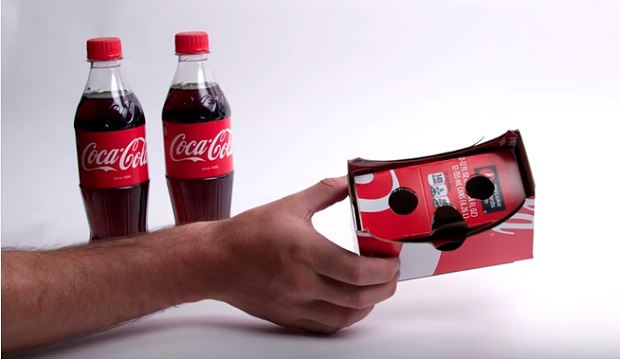Coca-Cola has revamped the cardboard packaging of its 12 packs so they can transform into a virtual reality headset that holds a smartphone.
While the packaging hasn’t yet hit stores, VR is something the company has been working on for a while.
Nick Felder, Coca-Cola Global Group Director of Film and Music Production, shared in a Coca-Cola Stories article, that the VR experience is “living up to its promise.” He continued: “Cardboard headsets are democratizing VR for the masses. They’re affordable, viable and a damn good experience.”
The brand previously dipped its toe into the VR world at the 2014 World Cup in Brazil, where fans strapped on VR goggles and were “transported” from the locker room to playing on the field.
‘A new channel for sharing’
“Consumer packaged goods brands are in a fantastic place for this”, explains Danny Meadows-Klue from the Digital Strategy Consulting group that has been coaching global brands on mobile marketing since 2000.
“Secondary uses of packaging ley people unlock extra benefits, and experiences that transform brand equity as well as extending front of mind awareness. What’s particularly smart here is that for a brand that’s all about sharing, they’ve found a way to create a brilliantly sharable experience – so it’s strategically a smart fit, rather than simply being a tactical conversation-starter”.
Meadows-Klue sees 2017 as the year VR will really take off, but the end of this year as a time to build the learnings, “Mobile World Congress this year was dominated by VR thinking, but beyond gaming, medicine, industrial training and few other niches, it’s yet to find that mass market gamechanger. As Facebook, Oculus and Samsung start scaling-up, you’ll see the market created. The Coca-Cola company is smartly getting ahead of the curve by giving consumers the chance to share tomorrow’s experience, today”.
McDonald’s joins VR game
Meanwhile, McDonald’s is another major firm expanding into VR. In Sweden, the fast-food corporation is offering a limited run of “Happy Goggles,” VR headsets that are made from folding Happy Meal boxes.
The Goggles are formed by tearing a portion of the specially designed Happy Meal box into a foldable outer shell.
Then a pair of included VR lenses are inserted into the cardboard form, which, like Google Cardboard, is designed to be used with a smartphone. Per Adweek, the chain created a skiing game called Slope Stars to pair with the VR headset.


Companies using Virtual Reality in Digital Marketing | LP Digital Marketing
[…] 2016. Coca Cola VR headset. Image. Available: https://www.netimperative.com/2016/03/coca-cola-turns-packaging-into-virtual-reality-headset/ (accessed 21 March […]